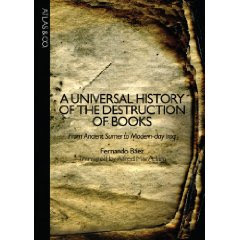South China Morning Post declara a Baez autor de la semana

History: A Universal History Of The Destruction Of Books
REVIEW OF THE WEEK
Richard James Havis
Dec 07, 2008
Email to friend | Print a copy
Written by: by Fernando Baez, translated Alfred MacAdam
Atlas, HK$200 ****
The Nazi book burnings of the 1930s are infamous. But as this learned work by Venezuelan librarian Fernando Baez shows, the desire to destroy the written word dates back to the invention of writing.
In A Universal History of the Destruction of Books: From Ancient Sumer to Modern Iraq, Baez theorises that a nation's cultural memory is primarily found in its literature, histories and poetry. Invading armies have often sought to control nations by destroying their libraries. This, he says, erases the national identity and makes it easier for the invaders to assimilate the conquered people into their own society and beliefs.
Even books that have survived such epic circumstances are not safe. They can be discredited by their ideological foes or eaten by natural enemies like moths. Madmen have devoured books in an attempt to gain their knowledge and proud authors have sometimes attempted to buy up many copies of their least successful works to set fire to them.
Literature buffs will revel in this marvellous, compact, oft-distressing history. Written by the director of Venezuela's National Library, it is a rare synthesis of pure literature and impeccable research. The form and style remind one of the breathtaking intellectual flights of Argentine writer Jorge Luis Borges, a librarian similarly obsessed with the labyrinthine magic of books.
Baez first became worried about the fate of books when he visited occupied Baghdad for an official assignment in 2003. Looters had just destroyed a million volumes in the National Library. "Why should this murder of memory have occurred in the place that the book was born?" he writes of his reaction.
Saddened by the event, he decided to research book destruction throughout history. His findings were terrifying. Book burnings are not infrequent and isolated catastrophes but regular events in all cultures. Sometimes it is an accident but the destruction of knowledge is usually motivated by a desire for power and control.
Baez's book starts with the first libraries, which were created in what is now southern Iraq from 4000BC. Early libraries were usually destroyed when invaders razed whole cities. The destruction of the great library of Alexandria in Egypt was reputedly carried out by Christians. But this destruction is one of the great conundrums of "biblioclasty", says Baez, who also contends the library could have been destroyed by Muslims.
The Middle Ages was also a bad time for books. Some Christians protected them from Viking invaders while other Christians destroyed them in the name of religious orthodoxy. Thousands of Greek comedies were obliterated when authorities damned them as frivolous and immoral. The Library of Constantinople was destroyed by followers of both religions. In the Fourth Crusade of 1204, many manuscripts were expunged, and Turkish troops threw 120,000 works deemed unacceptable to Mohammed into the sea in 1453.
Books are burned, Baez thinks, because a conflagration of ideas makes a book destroyer feel god-like. The power over words feels like power over death, he says.
Baez's own book stands in opposition to the book burners about whom he writes. It is a call for tolerance, the very qualities that lie at the heart of any great library.
Enlace:
http://www.scmp.com/portal/site/SCMP/menuitem.2af62ecb329d3d7733492d9253a0a0a0/?vgnextoid=1e3f28f95560e110VgnVCM100000360a0a0aRCRD&ss=Books&s=Life

Comments
quien lo convencio de una torpeza como ir
a dirigir la Biblioteca Nacional en lugar
de escribir los buenos libros que hace,
el peor error de su vida fue ligarse con los extremistas y su caso prueba que los intelectuales en el poder son un desastre
Marcos, Bogota